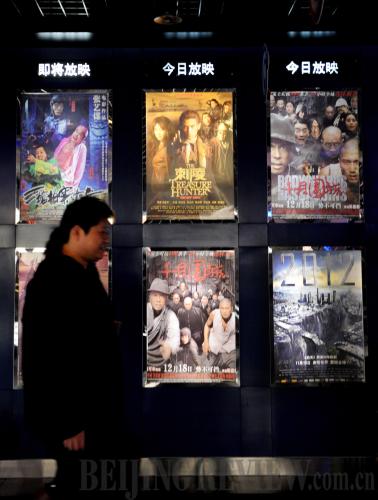|
Money is no problem
 |
|
GOLDEN AGE: A moviegoer walks past posters on the wall of a cinema in Zhengzhou, Henan Province, on December 22, 2009 (ZHU XIANG) | It used to be a dream of many Chinese directors and producers to have sufficient money to make movies. The shortage of investment and poor distribution channels used to be the two major blockades for industry development. In the past, the market concept was not fully understood and many in the industry failed to look at the movie as a real business to operate. But with the dawn of this golden age for cinema there seem to be no worries about money.
Last October, the Huayi Brothers Media Corp., one of China's biggest film and TV producers, gained approval to be listed on the country's NASDAQ-style growth enterprise board. Analysts say it's the best way for movie companies to gain large investments through the capital market, and to thus banish the impediment of raising money.
China's top box office performer and famous director Feng Xiaogang signed on with Huayi Brothers in 2000, giving him the latitude to concern himself solely with making a better film. The movie he produced that year took the biggest box office earnings and garnered several trophies.
Feng's rivals felt relief that he wasn't competing with them for holiday box office revenues this year because he is currently shooting his latest movie, Tangshan Earthquake. The Huayi Brothers expect the movie, with its all-star cast, will be a summer blockbuster.
More companies dive in
This year the China Film Group Corp., the largest and most influential state-run film enterprise in the country, cooperated with Hong Kong directors to make several blockbusters. The partnerships demonstrated how much the mainland market favors directors coming out of Hong Kong.
The expanding movie industry is attracting many TV producers as well. Dong Chaohui, founder and President of Beijing-based TV production company Joy Media Group, said now is a good time to shift to movies because of the industry's maturity and strong competition in the market. "Half of our business goes to TV and half goes to making movies. Our movies will be screened during important future seasons," said Dong.
Gaming companies also are not willing to be left behind. Perfect World Co. Ltd., a leading online game developer based in Beijing, invested in a big movie called Sophie's Revenge in 2009 to plant one of its game products into the film. The investment means that lead actress Zhang Ziyi is obsessed with the game in the movie.Game industry giant Shanda Interactive Entertainment Ltd. has also set up a joint venture with Hunan TV to enter into the movie market.
Online video-sharing companies are looking for new growth points by marching into the film field.
"It's inevitable for video companies to tap the upper reaches of the entertainment industry," said Liu Hong, Senior Vice President of Beijing-based video portal LeTV.com, "The content rules. As a content production company, we have to develop ourselves independently."
As marketing gains increasing importance, film and advertising companies are cooperating more closely. They have come to a common conclusion about how to plant brands into movies to promote them.
The cooling global economy has not had much impact on China's cinema industry. On the contrary, the industry has attracted attention from many outsiders, such as real estate and coalmining executives, who would like to invest money in films.
But some experts have warned that most movies will end up as nothing more than screenings for tiny audiences, and some may not even make their way onto the big screen. Last year, only 83 out of 450 domestically produced movies were viewed in theaters.
"Cinema owners all have the same primitive thought—all screens must go to the film that can make big money. So it sometimes happens that all cinemas in the country have the same movie on at the same time," said Zheng Dongtian, Secretary General of the China Film Directors Association. He said the reason is that the market has not been segmented, which allows different audiences to be targeted at the same time. | 